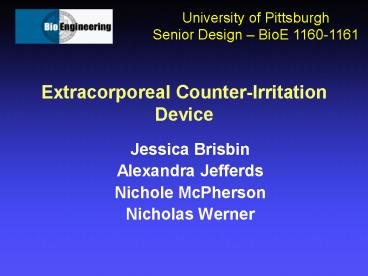Extracorporeal Counter-Irritation Device - PowerPoint PPT Presentation
Title:
Extracorporeal Counter-Irritation Device
Description:
University of Pittsburgh Senior Design BioE 1160-1161 Extracorporeal Counter-Irritation Device Jessica Brisbin Alexandra Jefferds Nichole McPherson – PowerPoint PPT presentation
Number of Views:96
Avg rating:3.0/5.0
Title: Extracorporeal Counter-Irritation Device
1
Extracorporeal Counter-Irritation Device
University of Pittsburgh Senior Design BioE
1160-1161
- Jessica Brisbin
- Alexandra Jefferds
- Nichole McPherson
- Nicholas Werner
2
Overview
- Needles are used in many common medical
procedures - Immunizations
- Administration of drugs
- Starting IVs and catheters
- Fear of needles (6-22 US population)
3
Overview
- An Extracorporeal Counter-Irritation
- Alleviates the pain, anxiety, and discomfort
associated with needle sticks. - Provides auditory, visual, and tactile stimuli.
4
Project Objectives
- For the child
- Significantly reduce or eliminate anxiety and
pain during needle sticks - For the doctor, nurse, or technician
- Allow him/her to focus on the medical procedure
- Not interfere or hinder in his/her ability to
perform the medical procedure
5
Competitive Analysis
- Hypnosis
- Causes patient to be deeply calm, however it can
wear off unexpectedly. - Tactile Therapy
- Shown to work in most case, however draws extra
attention to the site. - Diversion Therapy
- Distracts the patient and lowers anxiety, but
does nothing to prevent pain. - Local/Topical Anesthesia
- Only affects top two-three layers of skin, which
is not deep enough for most needle sticks.
6
Design Alternatives
- Alternatives
- Simon game
- Device administers injection
- Choice of lights/music/vibration
- Relatively simple
- Not too distracting (no motion of patient)
- Product remains non-invasive
7
Features Benefits
- 3x2x1? box (fits on small arms)
- Appealing color scheme (friendly to kids)
- Large on/off switch (easy for clinicians to use)
- Lights, music (distraction)
- Vibration (counter-irritation)
8
Engineering technologies/methodologies
- Materials
- Standard electronics parts
- Music chip
- Xbox controller motor (high resistance)
- Fabrication
- Circuit board
- Loose wires solder
- Paint (kid-friendly)
9
Description
- Improvements needed
- More streamlined case (animal shaped)
- All off-the-shelf parts
- Durable parts (music chip)
- Biocompatible strap
- Marketing
- Clients purchase for 30
- Patient base 20 million children under age 5 (US
Census Bureau, 2000 data) - Market base 7,569 hospitals (2005 data)
10
Risk Analyses
- Initial Hazards Analysis
- Case breaks ? Electrical Shock
- Remote, Severity III
- Flashing Lights ? Seizure
- Improbable, Severity I
- FMEA
- Part failure ? Device failure ? Patient pain
- Occasional, Severity IV
- Human Factors Analysis
- Rough handling exposes electrical components
- Occasional, Severity III
Severity I .....Severity IV
11
Obstacles to Market
- IRB
- Testing on children
- FDA
- ECI Device
- Low Risk ? Class I Device
- Registration Listing (21 CFR 807.20)
- General Systems (21 CFR 820)
- 510k
- EndoTwinn
- Class 1 Device
- Applies heat and vibration to tip of dental
instrument (Root Canals)
12
Project management
- Most tasks were group effort
- Chief Responsibilities
- Jessica Obtained parts
- Alexandra Built ECI device
- Nichole Solidworks, manager
- Nick Testing, Verification Validation
13
Redesign Ideas
- Animal Shaped Case
- Enhance distraction, kid-friendly, dangling legs
- Cleat-like bumps on bottom of device
- Enhance effects of vibration
- Use disposable tourniquet
- Have decorative screen which clips onto the
device between the patient and the procedure
14
Experimental design
- Awaiting IRB approval
- Clinical pediatric trials upon approval
- Childrens Hospital
- Ages 5-8
- Receiving stick on back of the hand
- Color Analog Scale (CAS)
15
Color Analog Scale
16
Preliminary Testing
- Randomized set of trials on group members
- Controlled factors
- With/without device
- Arm used
- Time between trials
- Hardness of snap
17
Results
n2
18
Verification and Validation
- Verification
- Housing (lt 6 in2)
- Weight (lt 8 oz)
- Working components
- Reduction of pain/anxiety
- Validation
- Focus Group ? Approved
- Clinical Testing
19
Acknowledgements
- Sources of funding
- Generous gift of Drs. Hal Wrigley and Linda Baker
- Department of Bioengineering
- James J. Menegazzi, PhD
- Dr. Daniel Thomas
20
Questions?































